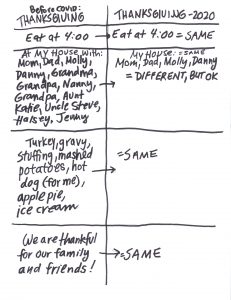

Tips for Helping Your Autistic Child Cope with Thanksgiving During COVID-19
Thanksgiving 2020 will NOT be a normal Thanksgiving. Here are some tips for helping your autistic child cope with all the change.
 By Jenny Burke — Nov 19, 2020
By Jenny Burke — Nov 19, 2020
Thanksgiving will be different this year for most of us. And if there is one thing we know, many kids with autism have a really hard time with change. The good news is that even in this unbelievable, crazy, difficult year, there are some things you can do to make things go a little smoother on Thanksgiving Day.
Tips for helping your autistic child cope with Thanksgiving during COVID-19:
1. Beginning now, prepare your child for how this year’s Thanksgiving will be different.
One of the most important ways you can help your child is to prepare them. Explain clearly what Thanksgiving will be like this year, especially in terms of what will be the same and what will be different.
I recommend you use a visual as you do this. Here is an example of an easy one you can create with your child, using a piece of paper and a pen. Each part of Thanksgiving is labeled SAME or DIFFERENT, BUT OK. I learned this very helpful strategy from the amazing Dr. Martin, a Cleveland Clinic Psychologist who worked with my son.

All you need is a pen and paper and 5 minutes to create this helpful visual with your child. You can look at it together each day between now and Thanksgiving.
For children who cannot read, or who need something more than the above visual, you could create a social story about what Thanksgiving will be like using photos or PECS pictures (Picture Exchange Communication System). Check out these printable Thanksgiving PECS pictures (thank you, adayinourshoes.com!) You could also ask your child’s school team to help you create a social story or other visual support.
Regardless of what you do, go over it each day between now and Thanksgiving, even if you only take a couple of minutes. Remember, the better prepared your child is for a different kind of holiday, the better able they will be to cope. In turn, the entire family will benefit!
2. Repeat frequently a mantra like this: “Thanksgiving will be different. Different is not bad, it’s just different.”
Mantras are a great tool when it comes to kids who struggle with being flexible. I speak from personal experience! They can be used in advance to help you prepare a child. Also, they can be used during tricky situations to help your child cope. Additionally, a mantra gives you something to say to an upset, argumentative child when you need to say something and reasoning really will not help.
Will you possibly need to repeat your mantra a hundred times between now and Thanksgiving? Yes. Will repeating that mantra a hundred times keep your child from melting down at the Thanksgiving dinner? Maybe not. However, if you repeatedly say a mantra like “Different is not bad. Different is just different,” your child might just begin to believe this!
I talk about mantras more in What To Do When You Lose Your Patience with An Autistic Child and in Tips & Topics, “Helping a Child Learn to Cope with No”
3. Encourage your child (siblings, too) to share their thoughts and feelings about Thanksgiving.
Chances are excellent that your child will feel disappointed, sad, and/or angry over changes to the holiday, particularly when longstanding traditions are completely out of the question this year. They might also be feeling anxiety: about these holiday changes, about whether they will go back to school after the holiday, about whether they or you will get sick, etc. It’s absolutely critical you find out what is going on in the busy, developing brain of your child. Talk to your child’s team if you need help on how to do this. If you need a tool to help your autistic child express their fears, anger, sadness, or any other thoughts and feelings, check out MooBoo’s Talking about Thinking.
When they do share with you their thoughts and feelings about Thanksgiving, respond in a way that let’s them know you are truly listening and understand. So rather than replying to a child, “It’ll be okay,” a Dad could say, “You feel sad Mommy can’t be with us on Thanksgiving because she has to work. I feel sad about that, too. How about we save some pumpkin pie and eat it with Mommy the day after Thanksgiving?”
4. Praise your child (siblings, too) in real time for being flexible and coping with the change.
Make a big deal right then and there whenever your child, in even a brief or small way, handles change, disappointment, or any kind of difficult situation – such as not being with grandparents on Thanksgiving. You do this to reinforce your child’s positive behavior. Be specific in your praise; e.g., “You are so flexible right now about Thanksgiving being at our house this year. I’m really proud of you, high 5!”
Parents, reinforcement is a great “in-the-moment teaching” strategy! To learn more about it, check out, “Spotlight: Reinforcement,” Tips & Topics.
5. Play your kid’s/kids’ favorite music during Thanksgiving dinner.
Okay, this might sound random, but bear with me! (Yes, I realize you might be totally sick of hearing the same songs over-and-over-and-over; I can relate!) But music is important to many kids. Be they little ones or teenagers, the music they love makes them really happy. It can also be calming.
Therefore, playing some Kids Bop or something else at low volume in the background during the Thanksgiving meal might result in a much more positive family experience. Also, your kid(s) might not ask to leave the table quite so soon!
If the idea of giving over total control of the music feels like too much, then strike a deal: you pick the music together, or you alternate 10 minutes of theirs, then 10 minutes of yours.
6. Cut yourself and your child some slack this year!
Normally, I would encourage you to use Thanksgiving as an opportunity to work on skills like table manners, staying seated for a meal, trying new foods, and back-and-forth conversation.
But this is NOT a normal year.
You and your family are going through a really tough time. I say this is the year you let go of some things. If you can persuade your child to come sit at the table for even just bit – that’s a win. If your child wants a hot dog and goldfish – go for it! If your child wants to eat off the plain blue plate as opposed to the fancier one – who cares?
You can probably predict now what your child will want to do during the Thanksgiving meal, and what they will refuse to do. So, you my friend, can also do some mental preparing, and letting go when it comes to the holiday! (But, if there are certain things you want to insist on, such as no portable devices at the table, begin preparing your child now as that will help!)

Here’s my own autistic kiddo as a little guy. As you can see, I was not a stickler for excellent table manners at Thanksgiving!
From the MooBoo Family to Your Family: Happy Thanksgiving!
We’re here to help! MooBoo’s mission is to help adults help kids with autism make progress. Free resources for parents here. For more about our affordable, parent-friendly digital products: learn more here.
We can learn from each other! Please share your thoughts on the above as well as your own advice on Thanksgiving.
Want to know when we post something new? Subscribe here.
Leave A Comment
Please be sure you understand our Comment Policy before posting a comment.You must be logged in to post a comment.